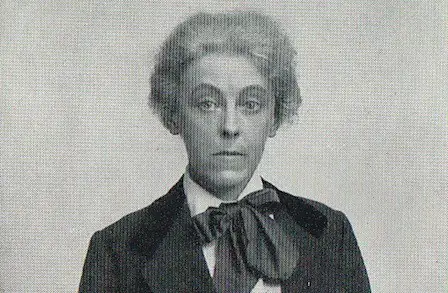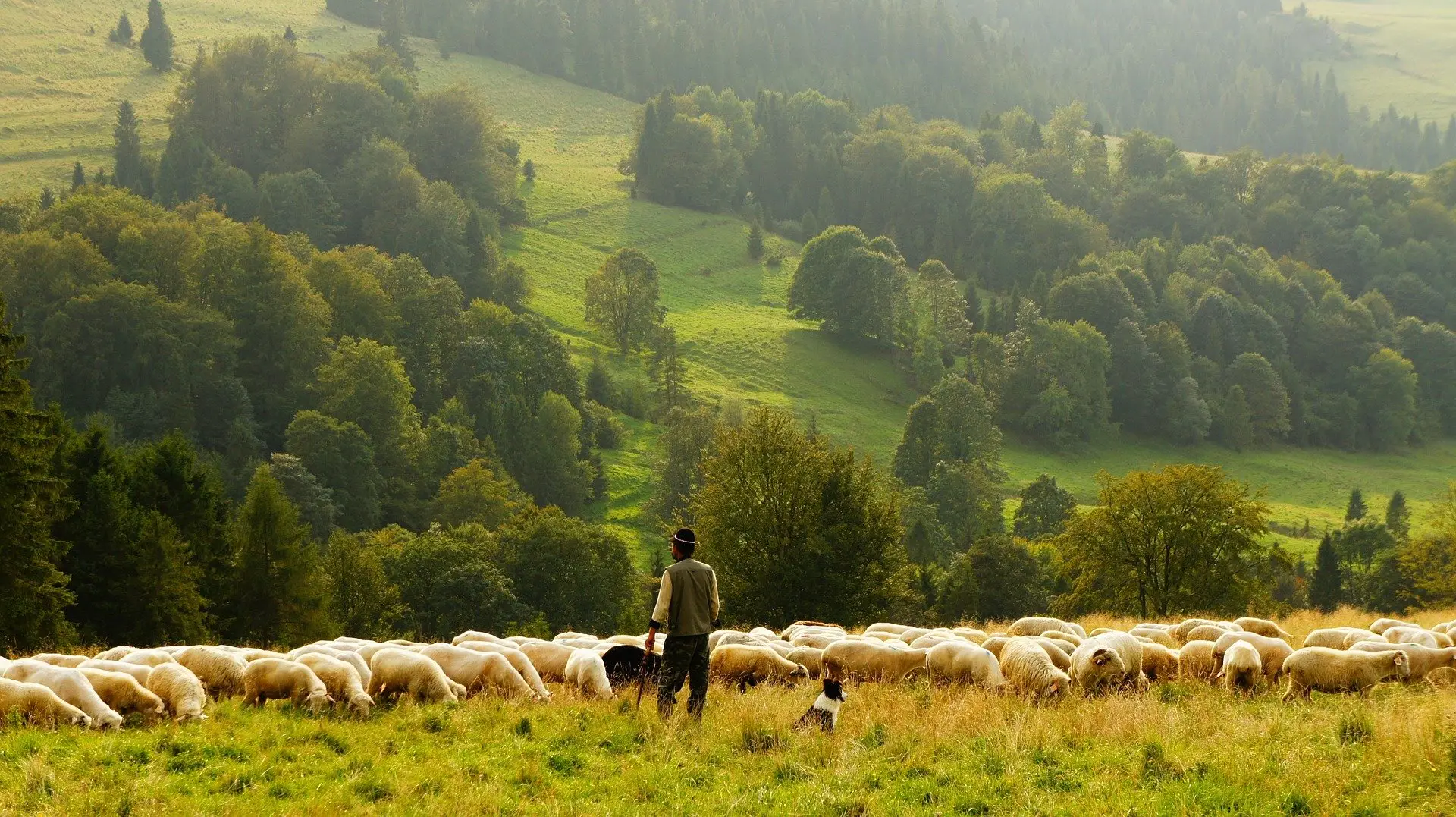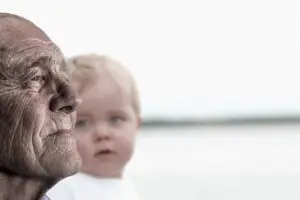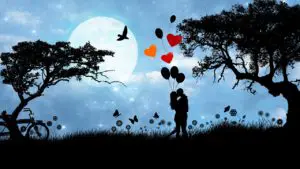
FULL POEM - SCROLL DOWN FOR LINE-BY-LINE ANALYSIS
Three
summers since I chose a maid,
Too young maybe—but more’s to do
At harvest-time than bide and woo.
When us was wed she
turned afraid
Of love and me and all things human;
Like the shut of a winter’s day
Her smile went out, and ’twadn’t a woman—
More like a little frightened fay.
One night, in the
Fall, she runned away.
“Out ’mong the sheep, her be,” they said,
’Should properly have been abed;
But sure enough she wadn’t there
Lying awake with her wide brown stare.
So over seven-acre
field and up-along across the down
We chased her, flying like a hare
Before out lanterns. To Church-Town
All in a shiver and a scare
We caught her, fetched her home at last
And turned the key upon her, fast.
She does the work about the house
As well as most, but like a mouse:
Happy enough to chat and play
With birds and rabbits and such as they,
So long as men-folk keep away.
“Not near, not near!” her eyes beseech
When one of us comes within reach.
The women say that beasts in stall
Look round like children at her call.
I’ve hardly heard her speak at all.
Shy as a leveret, swift as he,
Straight and slight as a young larch tree,
Sweet as the first wild violets, she,
To her wild self. But what to me?
The short days shorten and the oaks are brown,
The blue smoke rises to the low grey sky,
One leaf in the still air falls slowly down,
A magpie’s spotted feathers lie
On the black earth spread white with rime,
The berries redden up to Christmas-time.
What’s Christmas-time without there be
Some other in the house than we!
She sleeps up in the attic there
Alone, poor maid. ’Tis but a stair
Betwixt us. Oh! my God! the down,
The soft young down of her, the brown,
The brown of her—her
eyes, her hair, her hair!

LINE-BY-LINE ANALYSIS
STANZA 1
Three summers since I
chose a maid,
Too young
maybe—but more’s to do
At
harvest-time than bide and woo.
The poem is a dramatic
monologue from the perspective of the farmer and is written in an archaic,
matter of fact, colloquial tone which reflects his low social status. The
farmer likely would have begun work on the farm at an early age, missing out on
formal education. The first line is an allusion to the patriarchal society present
in England at the time that the poem was published in 1916, with the farmer
choosing his wife who, the reader can infer, had little to no input in the
marriage which were often based on convenience rather than love. The speaker reflects
that perhaps his bride was ‘too young’ for marriage, foreshadowing consequent
issues prone to arrive later in their marriage and in the poem. However, the
farmer priorities his work over romance, claiming that it would be impractical
to ‘bide and woo’ in an attempt to find a more suitable wife during ‘harvest-time’
– the busiest time of year on the farm.
When us was wed she
turned afraid
Of love and
me and all things human;
Like the
shut of a winter’s day
The speaker’s wife’s behavior
suddenly shifts in the immediate aftermath of them getting married.
Consequently, it is implied that her turning afraid ‘of love and me and all
things human’ is derived from getting married prematurely. The above is a
syndetic list which, along with the simile ‘like the shut of a winter’s day’,
emphasises the extent of her fear and reticence towards the speaker. Additionally,
the simile describes her newfound coldness and hostility towards him and the immediacy
with which they arose.
Her smile
went out, and ’twadn’t a woman—
More like a little frightened fay.
The happiness of her
soul was extinguished and ‘her smile went out’ like a candle. With this loss of
happiness, she became cold and hostile towards the speaker, in whose eyes she
no longer acted like a woman, but ‘more like a little frightened fay (fairy)’.
This simile represents her innocence and vulnerability as well as her fear.
One night, in the
Fall, she runned away.
Her fear overwhelms
her, prompting her to run away. Fear has consumed her, she is desperate – behaving
more like a frightened animal ‘afraid…of all things human’ than the woman he
knew before marriage.
STANZA 2
“Out ’mong
the sheep, her be,” they said,
’Should
properly have been abed;
But sure
enough she wadn’t there
Lying awake
with her wide brown stare.
Having discovered that
his wife has run away, the farmer seeks help from neighbours in the local
community who tell him that she’s been seen out among the sheep. It’s an odd
revelation that she feels more comfortable around animals than humans. ‘Lying
awake with her wide brown stare’ once again suggests just how unsettled and
anxious she is – her mind too engulfed by fear to rest.
So over seven-acre field and up-along
across the down
The enjambment
throughout and at the end of this long line creates a fast pace, reflecting the
speed, intensity and distance of the chase.
We chased
her, flying like a hare
Before out
lanterns. To Church-Town
The image of the group
of locals, presumably men, armed with ‘lanterns’ chasing her resembles a
hunting party perusing its prey. Additionally, the simile ‘flying like a hare’
is zoomorphism, comparing her and terror to animalistic instinct, exhibited by
a hare that is running for its life.
All in a shiver and a scare
We caught
her, fetched her home at last
And turned the key upon her, fast.
She is finally caught ‘all
in a shiver and a scare’, exhibiting the animalistic terror of a hunted animal running
for its life. In her overwhelmed, desperate mindset, she thought she was
running for her life such was the fear she felt of her husband and returning
home. After getting her home, the speaker ‘turned the key upon her, fast’. Her capture
and containment can be interpreted in two ways. Firstly, it could be argued
that the speaker has her best interests at heart, looking to protect her by
ensuring that she doesn’t run away again. On the other hand, there could be a
rather sinister interpretation that her containment is more like imprisonment
and the speaker seeks to control her, just like he would a domestic pet.
STANZA 3
She does the
work about the house
As well as
most, but like a mouse:
The narrative shifts
to the present tense in the third stanza, with the speaker commentating on
their lives now. It is apparent that she has resigned herself into the role of
domestic housewife, complying with the patriarchal society in which she lives.
Happy enough to chat and play
With birds and rabbits and such as they,
So long as men-folk keep away.
Despite settling into
this role, she remains as reserved and hostile towards her husband and ‘men-folk’
in general as she was when she ran away. The simile, ‘like a mouse’ signifies her
quietness and powerlessness, having been prematurely confined to the role of
housewife against her will as it is what the society in which she lives
dictates. It’s possible to empathise with both characters; the speaker simply
longs for some intimacy with his wife and neither of them is to blame that she
is unable to provide it. Instead, it is the patriarchy of early 20th
century England that is.
“Not near,
not near!” her eyes beseech
When one of
us comes within reach.
The word ‘beseech’
implies her desperation, like she is begging him to stay away. This line also
captures her sheer sense of terror as she communicates her fear through her
eyes rather than her voice, suggesting that she is so parallelized by fear that
she can’t speak. Her fear of all men hints at a history of abuse, perhaps in their
relationship. It’s not conclusive, but cannot be eliminated.
The women say that beasts in stall
Look round like children at her call.
I’ve hardly heard her speak at all.
At the end of this
stanza, the speaker gives a further insight into how she is far more
comfortable around animals than she is people. The animals seem to listen to
her as though she is their mother, giving her much more of a voice and
influence in this relationship than in her marriage. The last of these three
rhyming couplets concludes, rather emotively, that the farmer has ‘hardly heard
her speak at all’. Yet, as the speaker, he has sole control over the narrative,
akin to his position of power in their marriage and, consequently, the reader
is left unsure about how he has contributed to the state that his wife is in
and whether to empathise with him.
STANZA 4
Shy as a
leveret, swift as he,
Mew’s use of
zoomorphism through this simile once again reiterates the woman’s timidness and
fear of all things human as well as how untamed and unpredictable she is – in
the speaker’s eyes her behaviour is more animalistic than human.
Straight and
slight as a young larch tree,
Sweet as the
first wild violets, she,
To her wild
self. But what to me?
The above two similes
portray her physical and spiritual beauty, with her youthful attractiveness
being likened to ‘a young larch tree’ and the sweetness of her soul to ‘the
first wild violets’. Here, the speaker recognises her beauty but goes on to say
that it is confined only to herself, leading him to question why she cannot
share it with him as well in the emotive, seemingly desperate rhetorical
question, ‘but what to me?’
STANZA 5
The short
days shorten and the oaks are brown,
The blue smoke rises to the low grey sky,
One leaf in
the still air falls slowly down,
The cold, dark, sombre
imagery of winter is a pathetic fallacy for the speaker’s despair. The onset of
winter marks the end of the warmer autumnal months, reflecting the speaker’s reluctant
acceptance that his married life will be a lot lonelier than he had envisaged.
A magpie’s spotted feathers lie
On the black
earth spread white with rime,
This is another bleak,
melancholy image of winter. The image is solely black and white, devoid of
colour, which signifies how the speaker’s life is devoid of all joy and hope. ‘Rime’
is the frost formed on the ‘black earth’ and its icy composition mirrors the
coldness and hostility expressed by his wife.
The berries
redden up to Christmas-time.
What’s Christmas-time without there be
Some other in the house than we!
Christmas is, of
course, centred around celebrating the birth of Baby Jesus. However, the
speaker and his wife have no baby to celebrate. This pains the speaker who
believes that Christmas-time is about uniting and bonding with family which he
knows will never happen as long as he and his wife are alone in the house
together. Instead, he seeks a child to alleviate his loneliness.
STANZA 6
She sleeps up in the attic there
Alone, poor maid. ’Tis but a stair
The speaker reveals
the extent of their separation, with his wife sleeping in the attic – seemingly
the furthest away that she can get from him. The speaker’s tone throughout the
poem is rather self-sympathetic as he laments the loss of any intimacy with his
wife, however, he sympathises with her in this last stanza by referring to her
as a ‘poor maid’. Evidently, he doesn’t blame her for her reticence, perhaps
because he’s conscious that her getting married too young was its major cause –
for which he feels responsible.
Betwixt us.
Oh! my God! the down,
The soft
young down of her, the brown,
The brown of her—her eyes, her hair,
her hair!
The poem concludes
tragically as the speaker breaks down, in part fantasizing about his wife as
well as grieving the current state of their marriage. His longing to be close,
both emotionally and physically, to her is emphasised by the repetition of ‘her’
and the caesura of the exclamation marks which capture his desperation. His
calling to God illustrates his immense sorrow.


